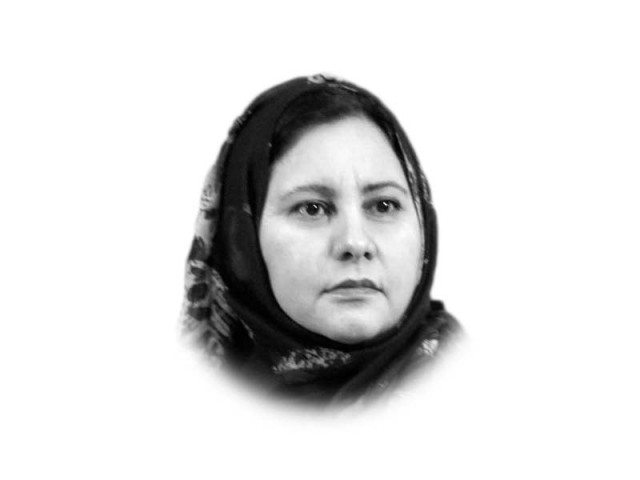Iqbal's Saqi Nama
The ship of my nation is trapped in the whirl of the ocean, it has stagnated

Re-reading Iqbal, the philosopher-poet of the Urdu and Persian tongue, is not only a pleasure, but also an act nurturing a fear, that of lilting the heart of a fire that has been put down under uncountable dusty layers of materialism, but whose ambers still smolder in the deep forgotten depths of passion.
This commentary on the selected themes of Saqi Nama comes with the hope that talking about the passion that Iqbal harbours in his heart may strike fire in the hearts of those who yearn for the depths that connect matter with spirit and spirit with the larger truth of existence, and that allow the creation to stand face to face with the Creator.
As the poem begins, Iqbal's saintly heart connects with the beauty of spring, realising how the colours and bustle of nature witness upon the seamless togetherness of nature, as if the same blood runs in the vein of the flowers, the streams and the boulders that line it. And the stir and hustle of nature suggest that it is cognisant with the larger plan of existence.
So, Iqbal calls upon the Creator Himself, to open upon him the hidden truths of the universe and beyond. Pour in the glass of my awareness the wine that opens the secrets of the eternity, of the first day, of how it all started, and why, he says.
Iqbal declares 90 years ago that the façade of the power and excellence of the West is crumbling down in front of us, and the spell of capitalism has broken; the Chinese are awakening from their slumber, and the East awaits the same strike from the Divine that smashed the Mount of Toor into rubble. The heart of the Muslim needs this electrification so that the idols, such as of culture, mysticism, law and theological dialect, that wind the hearts in their own entangling mazes can be smashed. The truth – that is beyond logic and diction, that comes with the fervor of love, that does not come with the stitching of wounds but with the raptures of the hearts and minds – is what Iqbal asks the Saqi-e-Azal to pour down in his beggars-bowl.
Tamadan, tasawwuf, shariat, kalam
Butan-e-ajam ke poojari tamam!
Haqiqat khurafat mein kho gayi
Ye ummat rawayat mein kho gayi
Bujhi ishq ki aag, andhair hai
Musalman nahin, raakh ka dhair hai
The fire of the soul has been put down and the Muslim has been left as but a heap of ashes. But I, Iqbal, do not aspire a void life like that, give me the wings to fly, and the heart that is ever troubled, blistered and vexed with the longing of You, anguished by the long stretches that part You and me. Return that freedom of thought to the minds, and plague our hearts with an unending affliction of Your yearning – an ever bothered, aching heart, put on fire, the fire of Your zeal. The heart of Murtaza (RA), the fervor of Siddiq (RA).
The ship of my nation is trapped in the whirl of the ocean, it has stagnated, give it the stir; lend my cries, my ambitions, my struggles, to the youth of my nation. My heart that has become the battleground for doubt and belief, that has become the mirror that shows me the reality of my days, smash it and disseminate its dust upon the hearts of my fellowmen.
And why Iqbal says he loves the Saqi-e-Azal so much, because with moisture and dust, He has created a universe full of volatility, diversity, life, being and becoming. So many sounds, so many colours, so many structures, He loves change and newness and does not like repetition. He creates this six-dimensional idol-house, and vanishes from its midst, so that He can see the drama of life unfold – and leaves the human souls therein to find the magnet of His, one, true existence.
The breath that has been breathed in the human soul is its becoming, and the ego (khudi) thus created, is its secret and its awakening. The ego, seemingly drunk with self-display, also loves solitude because it wants to rise above the battle of you and me, and realise its existence as a piece in the puzzle of boundless time and space, and find, eventually, itself in the presence of the Ultimate Ego. And for this, it keeps itself ever in journey, in investigation, in struggle. And for the reason that it aspires such a grand presence, it prohibits itself of compromising its own respect and nobility for any meager material reasons, it refuses to bow down to any not-God god.
Faraib-e-nazar hai sakoon-o-sabaat
Tarapta hai har zarra-e-kainat
Samjhta hai tu raaz hai zindagi
Faqat zauq-e-parwaaz hai zindagi
The ego (khudi) despises the discontinuation is its journey, it looks down at this worldly life as just a station it has to pass, not as the destination it seeks. It realises that the fire lit in its soul is not from an atashkadeh (fireplace) of worldly temples, rather it is from another far-off place. The calling of the ego is to break the spell of time and space, and to proceed and conquer other new universes of reality.
Teri aag iss khaakdaan se nahin
Jahan tujh se hai, tu jahan se nahin
For the passion of the ego, there are hundreds of new worlds yet to be explored, the stores of being and becoming are not exhausted, they await the explorer. Rather the reason for setting up this huge universe of unbounded time and space, of colours, sounds, of matter and the abstract, was actually meant to make it a mirror in which your khudi would be revealed onto you. And when that happens, you will become the conqueror of the worlds.
Ye mouj-e-nafs kya hai talwar hai
Khudi kya hai, talwar ki dhaar hai
Azal iss ke peeche, abad samne
Na had iss ke peeche na had samne
Safar iss ka anjaam-o-aghaz hai
Yehi iss ki taqweem ka raaz hai
The world is changing; new times have arrived. The Muslim needs to wake up from the dialectical windings it has learnt from others, that has turned his passioned heart into a lifeless, detached object. Time to reignite, activate and strike has come, time to take the reins of your fate in your own hands has come.
Sharab-e-kuhan phir pila saqiya
Wohi jaam gardish mein la saqiya!
Muhe ishq ke par laga kar ura
Meri khaak jugnu bana kar ura
















COMMENTS (2)
Comments are moderated and generally will be posted if they are on-topic and not abusive.
For more information, please see our Comments FAQ